Killing Me Softly
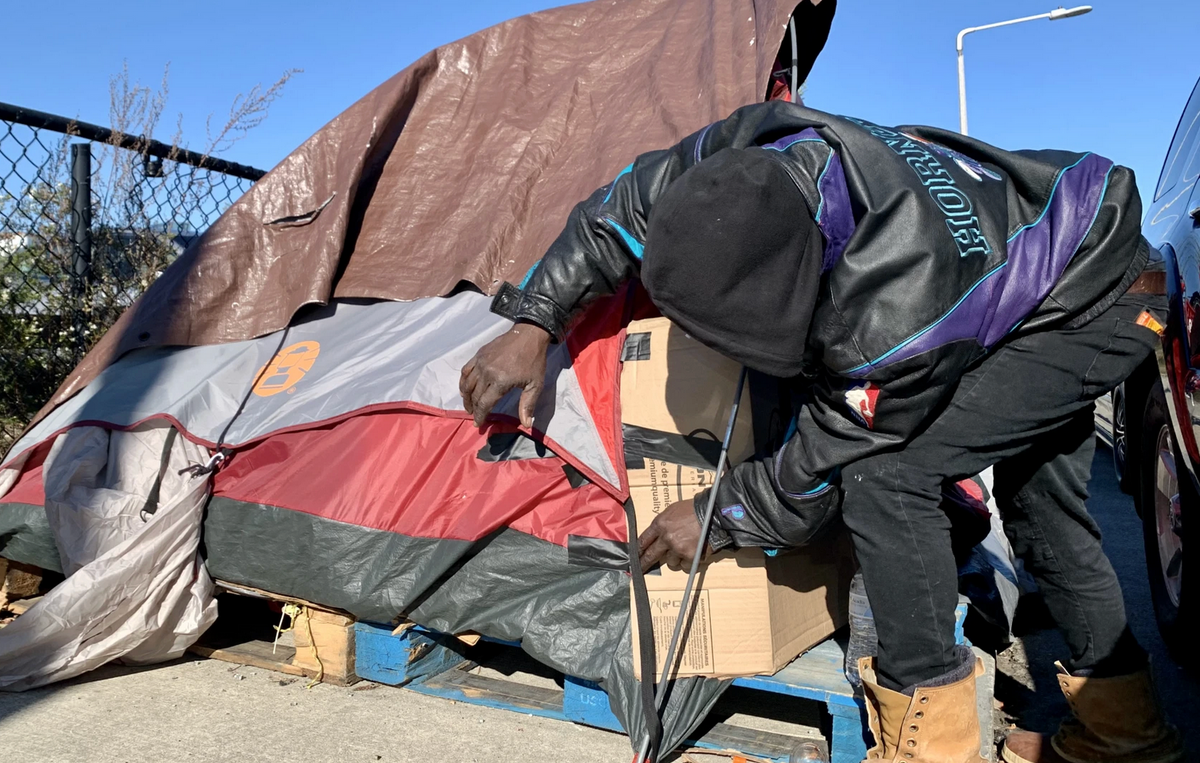
Why is it OK to make choices, which are inherently violent, as long as you perpetrate your violence "politely"? What's more, the polite and even pleading response to the violence, somehow, is rude? As a "neurodivergent," I have never understood this duplicity. Killing me softly is still killing me. Perhaps I am being guileless, and failing to read between the lines? I have had people say to me, "Well, of course the people who have money and power execute at an arm's length and with decorum, and victims are always blamed." As if this is a given. But I am not a victim, so why does the script get flipped on me, when I speak up?
What the heck am I even talking about? Well, specifically, in this case, I am talking about housing. More specifically, housing in metro area suburbs in America, where it is desperately needed. People love to complicate the issue of homelessness. They like to say that homelessness is about drugs and vice. Recent large-scale studies show that drugs and vice do not lead to homelessness, however. In places where there is enough housing, high levels of poverty and drug use are uncorrelated with homelessness. It's looking like homelessness may be a result of there not being enough... homes. In a game of musical chairs, agility eventually fails to guarantee you a chair.
Let me lay out my basic argument: Housing needs to change, or there is no future. The top two reasons being greenhouse gas emissions, and the corrosive effects of insufficient housing supply. Written in code form: No_Change = No_Future. Therefore, if you block change, you are foreclosing on the future. It's oversimplified, but undeniably true, (which I will discuss in more detail later). Why do we celebrate when a tiny group of people preen about their property values, by mortgaging the future of the entire planet? Isn't that a fundamentally violent thing to do? Why is that basically acceptable, and being morally disgusted about it is not? I say this as a property owner.
James Baldwin wrote, "I may or may not be bitter, but if I were I would have good reasons for it: chief among them that American blindness, or cowardice, which allows us to pretend that life presents no reasons for being bitter." What I struggle with, is a much diluted version of the conundrum, which Baldwin faced. One reason I look to James Baldwin as a personal hero, is exactly his ability to face undeniable cowardice, and not drown in bitterness. It is the Black people of America who have been soaked in the crocodile tears of their oppressors, the moment they utter any utterance that sounds even remotely like self-respect.
My place in the maelstrom of shifting intersecting hierarchies is not the same as Baldwin's, and his talent far eclipses mine, if I have any talent to speak of. But I feel the same need to expose the hypocrisy. When I do that, the script gets flipped! NIMBYs initially call me bitter, when I advocate for more housing: "Someone is sour grapes because they don't own anything." When I reveal myself to be a property owner, who would benefit from selling my soul, they morph into Ghandi: "Your opinion doesn't count because you are rich, and rich people are out of touch." Bitch, you are rich too, and you're the one making arguments based on the sanctity of property values. It honestly gives me whiplash.
If you are old, maybe you don't care about there not being a future... Although for the sake of your loved ones, you probably should, even selfishly (to say nothing of the desirability of being unselfish). Somehow it's perfectly acceptable and normal to say, "Oh well, my neighborhood is quaint and I want it to stay quaint." Let me translate your statement for you, "Oh, my minor aesthetic preference should take precedence over young families basic need for housing." Frankly, I think there should be triple taxation on retirees who have parked themselves in single family zoning, and whose ample free time has plagued planning boards across the nation.
Too much? I say my initial translation doesn't even go far enough. Really what you are saying is, "I don't care if little children live on the streets, witness squalor and terrifying privation, fall ever deeper into a poverty pit that eats them alive, and wind up growing into diminished and diseased adults, all because I want my bank account to have marginally more money in it when I die. Money that, mind you, I won't get to use, because I'll be dead. And my bratty children–who are bratty because I used zoning to make sure they existed everywhere and always in exclusive spaces–will simply squander on consumption, which will fail to bring them happiness. If consumption is even a thing once the water wars begin."
Every person who has paid for heat, air conditioning, and hot water in a single-family home knows that these homes are gas guzzlers. Nobody needs to look at data to know this. The unit of measurement for heating "historic" homes is in the thousands of gallons. We are burning oil like there is no tomorrow, to live in the shoddy paper barracks, which we think are so quaint. You can't even switch to solar, heat-pump, or geothermal in a poorly insulated home. "Retrofitting" costs a fortune, and should be reserved for rich hobbyists. It also does nothing to increase the supply of housing.
Data helps silence people, who deny obvious realities. So let's look at some data: The Environmental Protection Agency publishes a Greenhouse Gas emissions inventory. The following chart shows the estimated share of end-use greenhouse gas emissions. You can see that about a third comes from energy demands of buildings. Another third comes from transportation, which of course, is much less efficient in car-dependent sprawl. Conceivably, as much as two-thirds of GHG come from housing. Regardless of what the exact contribution is, it is safe to say that single-family sprawl is disastrous for the climate.
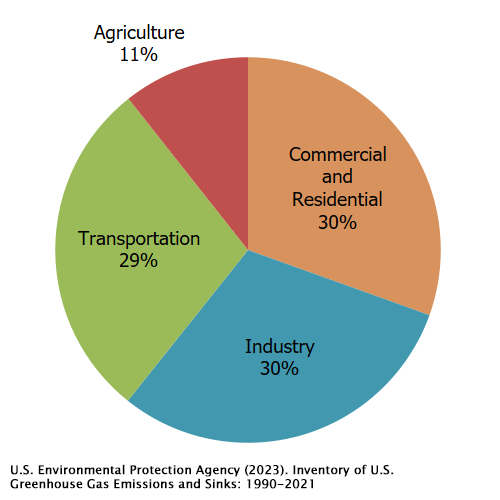
More data: A 2011 study conducted by a third party research firm, with support from the US EPA, included contingent transportation in an estimate of residential GHG emissions. A comparison of different types of housing shows that new construction transit-oriented mult-family housing is >3x more energy efficient than obsolete conventional suburban development.
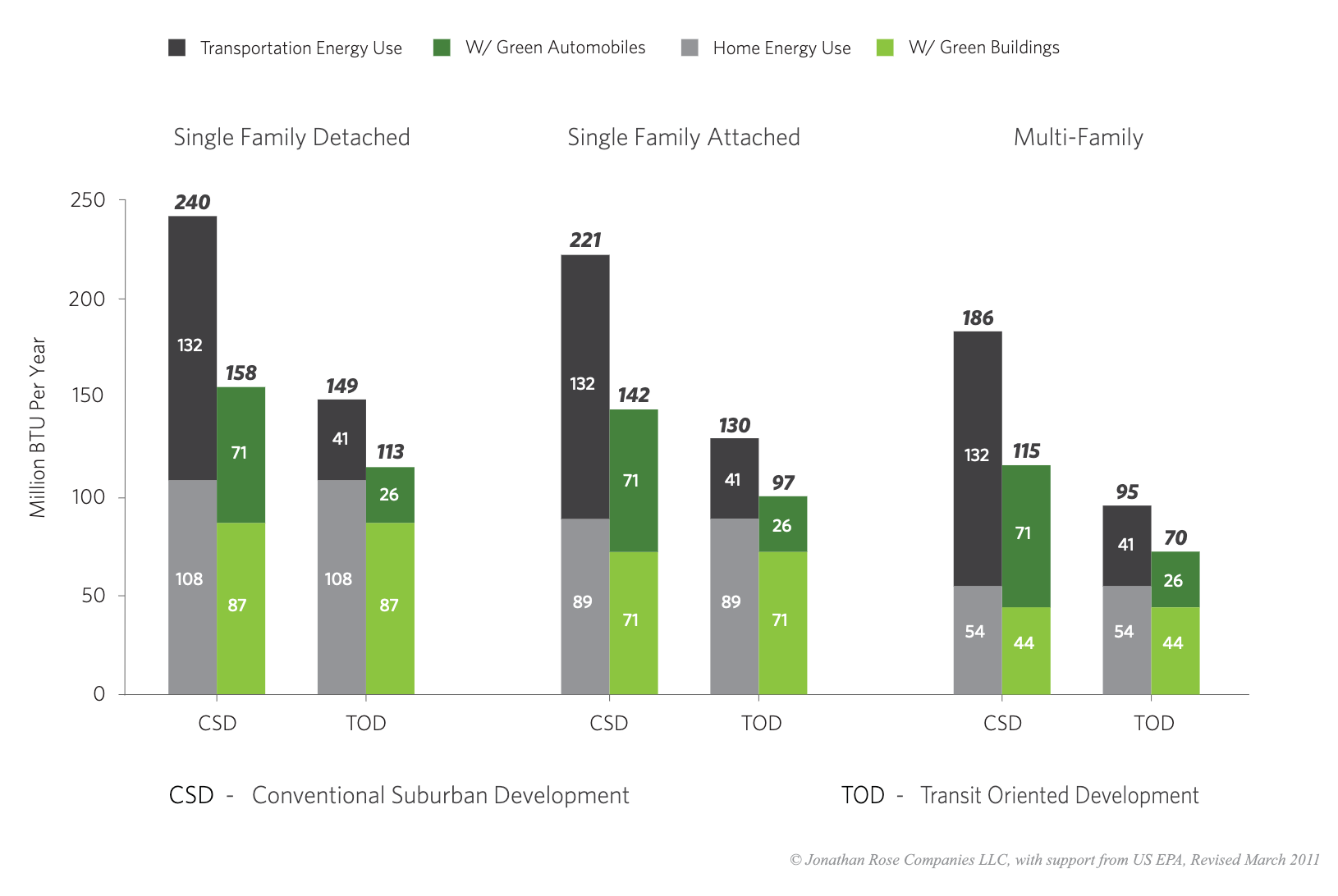
Another study from the Environmental Science & Technology Journal, uses linear regressions to estimate "end-use" energy consumption inside the home (measured in megaJoules). In the figure below, you can clearly see that even the oldest, most obsolete multi-family homes perform better or about equal to the newest single family detached homes (heavier markers are used for effects which are significant at p < 0.05, whereas smaller markers are for effects significant at p<.01).
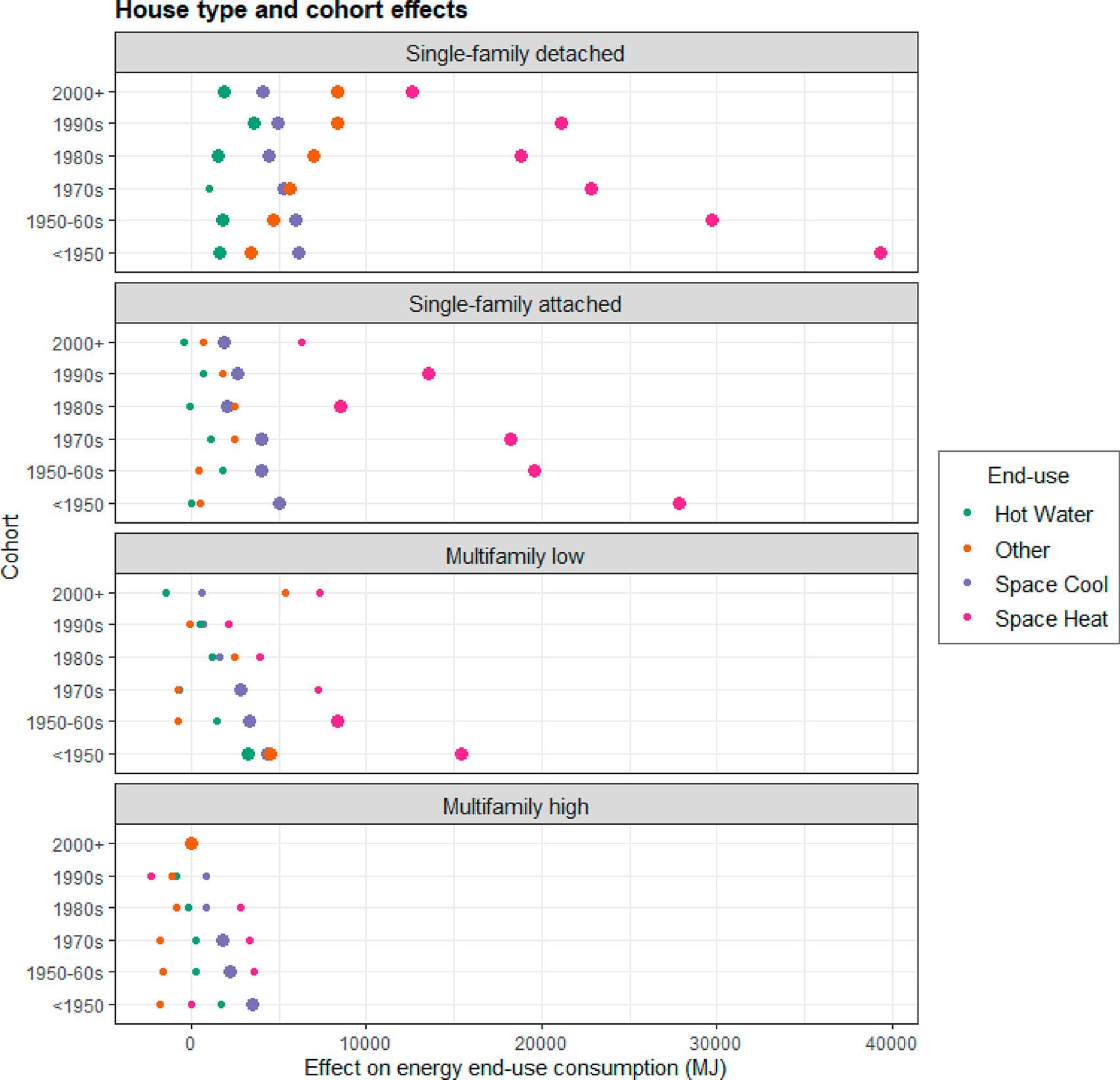
Obviously housing varies, and some folks have built themselves triple-insulated off-grid detached homes, which are climate neutral, but this is a huge upfront carbon footprint, and the end product is hardly representative of the typical suburban home. There are so many studies showing the superior climate properties of multi-family, but again, it's just commonsense that multi-family is going to be much better for the environment than detached single family. And the impact is huge. You're talking about potentially half of greenhouse gas emissions being wasted on suburban sprawl.
Truly, I get why multi-family in the United States gets a bad rap. In the next two charts, you can see that we, as a nation, essentially gave up on multi-family construction in the 1970's. As a result, much of the multi-family housing stock that exists today is old. I have lived in apartment buildings. I know how demeaning it feels to be unable to put your newborn to sleep because your neighbors are having a raucous party, or to be unable to find peace and quiet because your neighbor's dog is barking. But modern building codes require better soundproofing, which would address many of the indignities of living in a box, in a stack of boxes.
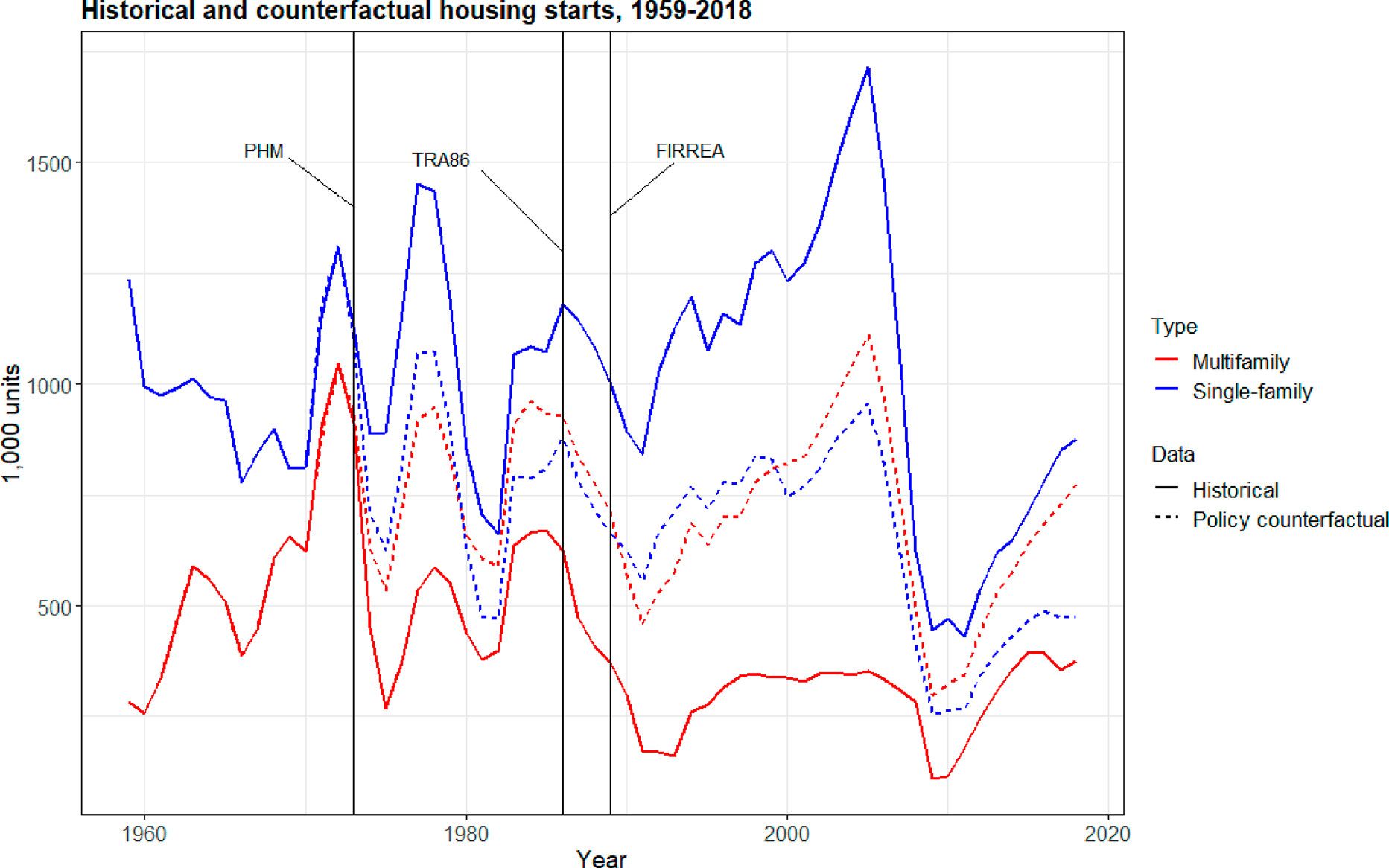
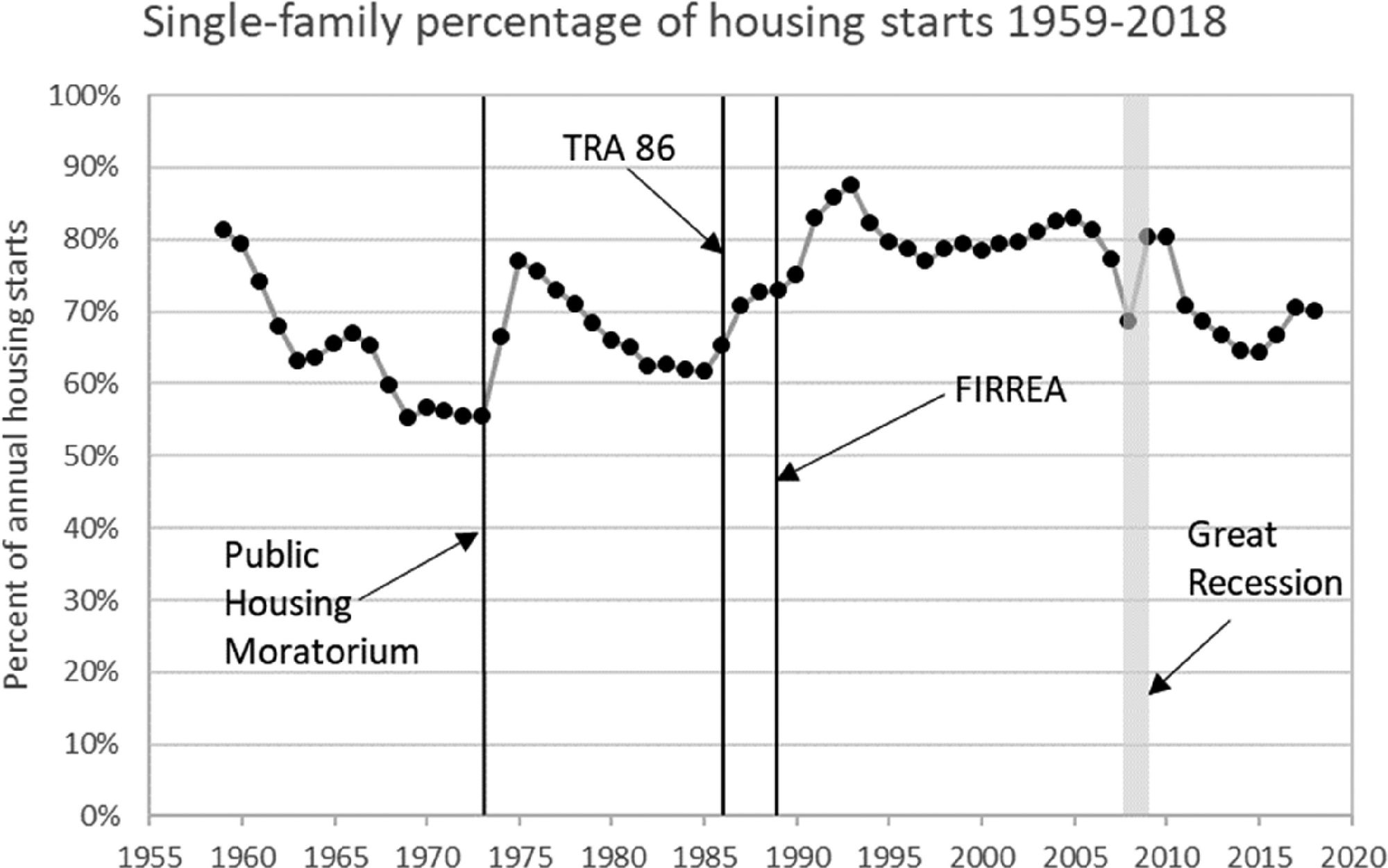
I appreciate the negative stereotypes about multi-family, truly. But I am an immigrant to the United States, and a descendant of builders of medium density middle class multi-family housing in urban Switzerland. I can tell you that not every country in the world shares what I consider to be an uninformed and provincial view of apartments. If we could build more new apartment buildings, and if developers weren't forced to squander 30% of their budgets on lawyers fees and wasted time, we would change the perception almost overnight. There is no housing better than a modern condominium building with huge windows, outdoor space, and underground parking. Nothing compares.
It's just not effective to be angry, right? You have to use your anger productively. In my mind, I am not angry. I am simply matter-of fact. To me, the "character of the neighborhood" stuff is putting on airs while the rest of us burn. To me, this is Yurtle the Turtle stuff, I am a turtle named Mack, and I want your delusional self unceremoniously tossed off of my back. I am not angry. I just want a future. Is that so much to ask?
"I don't see you moving to live next to multi-family housing." Wrong again. I live in a suburb, but that's because I was ultimately forced out of NYC. I would much, much, much prefer to live in a comfortable condo in a medium-density walkable downtown, nearby a public park, than to live in suburban tract housing. I don't need my own yard. The constant maintenance is really annoying. But there are no affordable walkable cities in this country. There simply are not. Because we haven't built them.
These days, I find ever more that calls for civility are in bad faith. I am done with propping up people's delusions about the desirability of the suburbs. Where do people get off smothering my children's future, and expecting me to not only sit there and take it, but to treat their views with tenderness and compassion? Yeah, I know what it's like to fret for my property values. Because I know what it's like to be greedy and pusillanimous. It's clear to me on a religious and philosophical level, though, that the point of life is to fight these base tendencies towards greed and smallness.
I plan to make it my life's work to show up at the Planning Board, as a countervailing voice. Cool small cities are cool. Every European knows this. Most people don't have time for this type of civic action, but I will make the time. To me, a bad faith attack on my right to exist is a call to arms, and a call to arms is anything but polite. And there is no way to meet a call to arms except to fight.